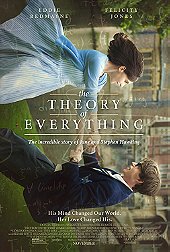Dear god, was this year’s Oscar theme the year of incredibly dull films about white dudes? Granted, The Theory of Everything is one of the better films to come out of that particular genre this past year, but it’s still only merely adequate. It’s a good film about an interesting subject, and like many of the others released in the 2014 awards season, it tackles that interesting subject in as easily digestible a way as possible.
Based on the book by his ex-wife, Jane, The Theory of Everything tells of Stephen Hawking’s college education, long-suffering marriage, intellectual pursuits, and eventual celebrity. Ironically, despite being based upon her book, Jane is often cast to the side of the inner emotional turmoil going on in the story, and frequently reduced to the long-suffering wife role.
The film’s treatment of massively complicated mathematical and scientific formulas in a simplistic manner doesn’t bother me. It would be hard to gain interest if they were talked about as they truly are, so simplifying them are audience participation isn’t one of the major problems I have with the film. No, it’s the too often on-the-nose symbolism that irks me. Hawking’s obsession with spherical shapes and rotund images liter the film, like he can’t go a few minutes without noticing a swirling galaxy in his tea cup.
I suppose I should be thankful that a biopic is trying valiantly to even indulge in a stylistic flourish when the genre so often adheres to risk aversion as a matter of principal. But whereas similar films like The Imitation Game contort their stories into grossly misrepresentative and artless shapes, The Theory of Everything at least manages to acknowledge the complicated emotions at play, even if they do sometimes feel more fully developed from Stephen Hawking’s perspective.
Biopics are also a typical excuse for an actor to demonstrate their stuff. Think of how Charlize Theron forever shed the pretty, vapid girlfriend/wife roles she was stuck playing by going full-tilt as a serial killer in Monster, or the way that Forest Whittaker finally got some overdue recognition by smothering his innate likability with crazed despotic rule in The Last King of Scotland. Similarly, Eddie Redmayne finally gets a role that shows what he is made of as an actor. I’ve found him to be solid and dependable in other things, even if the material was beneath him like My Week with Marilyn, but he truly exhudes extraordinary depths of characterization and emotive acting in this. Frequently he can only capture the rascally spirit that still burns within the broken body with just a twinkle in his eyes. While my preference would have been for the comeback kid Michael Keaton (I have an eternal soft-spot in my heart for him as my childhood Batman and Beetlejuice), Redmayne is a worthy Best Actor winner.
Given less to do is Felicity Jones. I thought she was fabulous in Like Crazy, but she occasionally seems out of her element here. In later scenes where her character has to age, she lacks the gravitas (and age make-up) to believably play a middle-aged woman. Jones is undone by looking eternally like the fresh-faced and perky college student we first meet her as in the film. An odd choice on someone’s part, and while she’s never less-than-good, she’s also never truly soaring to the same heights as Redmayne. This might have something to do with the fact that she’s shuffled off to the sidelines for long stretches, and when she is given a chance to emote it becomes distracting to notice that she has not been aged up like her co-stars who have been aged at least somewhat.
Perhaps the biggest sin of The Theory of Everything is how it dances around so many of the topics, ripe for emotional plundering, hanging in the air. Jane’s emotional frustrations? Merely given lip-service. Extramarital affairs? Treated far too chastely. It’s a very safe, sanded-down variation of the events as widely known. It didn’t need to be. Somewhere lurking in The Theory of Everything’s lovely amber glow is a much better film about the realities of living and loving someone with an incurable illness, of falling out of love with each other, and a story that captures more complicated emotions in fullness. It’s not a bad film, it’s just the blandest one that could have been made out of these parts.
 Login
Login